- Home
- Tracy Chevalier
A Single Thread Page 8
A Single Thread Read online
Page 8
Without the classes, she turned to Gilda for advice, and they began meeting regularly at Awdry’s for coffee at lunch or after work to discuss embroidery, though they strayed into many other topics. Gilda was such a talker that Violet found she rarely had to ask questions. Her new friend was unswerving in her support for Violet’s new life in Winchester, and it made her grateful to be encouraged to feel less guilty about leaving her mother. Gilda had her round to the Hills’ for tea one night, wrecking the kitchen in her quest to make the perfect shepherd’s pie for her guest. It was delicious, but Violet had to eat it under the baleful eye of her old office mate Olive, now installed as the newest Hill, swelling with the next Hill. She preferred to see Gilda elsewhere, at Awdry’s or the cinema or sunning themselves out on the Outer Close.
During the summer Violet also began to visit the Cathedral more often – for practical reasons rather than for spiritual sustenance, to study the kneelers now in use in the choir and presbytery and check her border stitching against them. Gradually she became aware of some of the daily activities taking place there. There was a bustle to the building that had nothing to do with prayer and contemplation. It was more like Plummers, the Southampton department store where she went to buy stockings or gloves or bath salts. Plummers seemed to be filled with shoppers, yet when you looked more closely, there were clerks everywhere, folding clothes, setting out samples, pushing trolleys full of merchandise, sweeping the marble floors. Occasionally when a ’flu epidemic temporarily reduced staff numbers and dustballs accumulated in the corners and clothes were left in untidy heaps, it became clear how much Plummers relied on its workers to keep it running smoothly.
Violet suspected it was the same with the Cathedral workers who, apart from the vergers, were mostly volunteers. There were the ladies arranging flowers in stands under windows and by pillars. There was the man setting out candles for lighting at shrines, and scraping away the old wax from previously lit candles. There was the woman laying out kneelers on the chairs in the presbytery, squaring them so that they sat even. There were two old men gathering up the prayer books and storing them in boxes. There was the man polishing the brass candlesticks on the altars, and another mopping the mediaeval tiles in the retrochoir. There were the two women who called themselves the Holy Dusters, going around and wiping down every possible surface. There were the vergers, rushing past with a jar of communion wafers, a green robe, a Bible.
One evening after work, Violet sat in the presbytery, inspecting a kneeler to see how the broderer had blended the blues, and considering how to do the same with the yellows in the borders she was working on. As she pulled at the stitches, someone took the seat next to her. She was startled to find it was Louisa Pesel, and let out a little yelp, then apologised.
Miss Pesel smiled. “I like to come here sometimes just to sit and look.”
Violet nodded. It felt like having a member of the Royal Family choose to sit by her, though one wearing a brown turban trimmed with a tuft of feathers.
“Sometimes I wonder if we couldn’t use even more colour here. It’s so dark – especially in the choir stalls.” Miss Pesel nodded at the wood stalls to their left. “The stone and wood just soak it up, even the mustard yellow some are complaining about.”
“People are complaining?”
“Oh, yes.” Miss Pesel’s laugh was like a low bell ringing through the presbytery. “They say it’s vulgar and inappropriate in a religious setting. Not Dean Selwyn, of course. He has always been on our side. Indeed, it was he who asked me to organise making these cushions and kneelers, having seen those I’d made for the chapel at Wolvesey House. I didn’t stint on colour there. He knew what he would be getting, and he hasn’t wavered in his support.”
“Have you always embroidered?”
“Since I was a girl, yes. And then I taught it – here and abroad – and that rather set me on the path for life.”
“Abroad?”
“I taught embroidery in a girls’ school in Greece for several years. I became something of an expert in Greek embroidery.”
“Gosh.” Miss Pesel seemed so English that it was hard to imagine her in a foreign climate – gently perspiring in blazing sun, teaching a class of Greek girls the rice stitch or long-armed cross in a stark white building against a background of bright blue sea and sky. Violet wanted to ask about a husband, but didn’t, for that was the question she most hated being asked herself.
“I travelled a bit too,” Louisa Pesel continued, smiling at the memories. “To Egypt, to India. Glorious. I even rode a camel once! Then during the War I was back in Bradford—”
“Bradford?”
“Indeed. I grew up in Bradford. During the War I taught embroidery there to convalescent soldiers. Do you know, Miss Speedwell, sewing can be so therapeutic when one has had trauma. The bold colours and the repetition of simple stitches had such a soothing effect on the men. There was something about creating a thing of beauty that worked wonders on their nerves. I was very pleased with the results.”
Violet had a vision of George and Laurence sitting in a muddy trench, stitching a row of red eyelets, and shuddered.
Louisa Pesel didn’t seem to notice, or was too polite to say. “So, is that yours, Miss Speedwell?” she asked, nodding at the kneeler in Violet’s lap. “I know the broderers like to come and visit their work in situ, as it were.”
“No, I was looking at others’ work to see how they handled blending colours.” Violet was pleased that Miss Pesel remembered her name.
“Which pattern are you working on over the summer?”
“Oh, I’m not making a kneeler. Mrs Biggins has assigned me to make borders for the cushions. Lengths and lengths of borders.”
“Have you made your sampler?”
Violet nodded.
“And taught the stitches to someone else?”
“Yes. In fact, she has now joined the broderers.”
“And would you like to make a kneeler?”
“I would.”
“I’m curious, Miss Speedwell. Why? There will be over three hundred kneelers, so yours would get lost in the crowd. Whereas there will be far fewer cushions, and they’ll be very striking, and the borders of course will be essential to making them three-dimensional. There is no shame in sewing borders.”
“I know. It’s just—” Violet stopped.
Miss Pesel said it for her. “You want to make something wholly yours that will be properly seen and used.”
“Yes.”
Miss Pesel was looking at her expectantly, as if she had handed her a book to read from. Violet realised she was expected to explain herself more fully, though she had not really thought it through. “I grew up in Southampton,” she began, “and we attended St Michael’s. My mother still does.”
“I have been. A handsome church.”
“Although I have gone all my life – to Sunday school, for communion classes, to Sunday services – I have never truly been at home there. Especially not after – not after my brother’s death during the War. The service for him felt perfunctory. The vicar had performed so many of those services that he could have done it without any notes. He knew George, but he led the service as if it meant nothing.”
She stopped.
“That must have been hurtful,” Miss Pesel said.
“It was bewildering. It was not just that it seemed God had abandoned us, but that the Church of England had too. It gave no answers, no comfort. I wanted the vicar to reconcile the loving God he spoke of with the destruction wreaked on a generation of men, and indirectly on us women too, but he did not. After that I got out of attending as often as I could. I managed always to have a headache on Sunday mornings.” She shook her head at the thought. “My mother complained, told me I was an insensitive sister and daughter. But my father understood, though he never said anything.
“I suppose I am looking to start again, here.” She glanced around at the high stone walls and the vast space above them. “But a cathedral is ov
erwhelming. Spiritually as well as physically. I thought if there was one small part of me here, that might help. A contribution that would make me feel connected. And something I could actually use, or that others could use. A border of a cushion is not quite the same as a kneeler.”
Miss Pesel nodded. “What you say reminds me of the many people I see who come here and light a candle. That one flame in the great expanse of the Cathedral. They look at it, come back to it. It is theirs.”
“Yes, but a kneeler lasts longer than a candle.”
“Indeed. All right, then.” Miss Pesel stood and gestured at the kneelers on the chairs around them. “Choose the design you would like to make.”
Although this was the desired outcome, Violet had not expected it to be so quick and definite. But Louisa Pesel was decisive. Now Violet must choose. She already knew, and pointed to the kneeler with the chequered acorn caps – the one made by DJ.
Miss Pesel nodded. “That is a good one. I am pleased with all of the designs, by and large, but like a mother with her children, I secretly have my favourites too. Come, then, let’s go to Church House and get your materials. I have a key with me.”
“But – Mrs Biggins …”
“I shall handle Mrs Biggins – though I suggest you stitch the long borders she has assigned you as well, if you have the time. We can’t have her master plan go awry, can we?”
Chapter 8
MRS SPEEDWELL’S BIRTHDAY FELL on a Saturday in early July, and Tom and Evelyn hosted a celebratory lunch in their garden. It was a hot, bright, glaring day, but Violet’s mother insisted on wearing a long-sleeved navy wool dress and thick stockings, as if it were November. “Oh dear, no, I’ll be far too hot,” she declared as she stepped into the garden and gazed on the table Evelyn had carefully laid with polished silver, ironed linen, and a vase of freshly cut daisies and delphiniums. Marjory was diligently sprinkling plants with a watering can while Edward bashed them with a stick, ignoring her protests. Mrs Speedwell winced at their shouts.
“We’ll seat you in the shade,” Evelyn replied, clearly unwilling to reset the table inside. “There’s a fan at your place.” She was wearing a stylish pink and grey floral tea dress that Violet envied, but she looked hot and distracted.
Violet smiled to herself. It was rare for her sister-in-law to make such a blunder. She could have told Evelyn her mother did not like sitting outside when it was hot. Whenever the Speedwells were on holiday on the Isle of Wight, Mrs Speedwell usually ended up sitting in the window of the guest house as the rest took their tea out on the lawn in the sun.
The Speedwells had been going to Ventnor on the Isle of Wight for two weeks in August since Violet was a girl. It was where her father had been happiest, taking them out in hired boats, rambling on Tennyson Downs and out to the Needles headland, pottering about amongst the dinosaur fossils on the beach with his trousers rolled up and a handkerchief tied over his balding head. Because he was happy, Violet was happy. They all were, even her mother, who softened a bit away from the rigidities of home life. Only one year when Violet was twelve did they try a different place – Hastings, with Mrs Speedwell’s sister, Violet’s Aunt Penelope – and they all missed the Isle of Wight. The tradition was so strong that it survived George’s death. Evelyn had to go along with it – which she did with a fixed smile for those two weeks.
“The garden’s looking lovely, Evelyn,” Violet remarked, acting as mediator for once. “How jolly to be able to eat out in it. Perhaps we could have tea inside afterwards, and Mother could open her presents then.”
“Presents now! Presents now!” Edward cried, and Marjory joined him, a notch less exuberantly. “Granny’s presents now!”
Granny brightened at the prospect of presents, and sank into her place of honour in the shade.
“Will you take some barley water, Mrs Speedwell?” Evelyn asked. She had never called her mother-in-law by her first name; nor had she been encouraged to.
“Oh no, dear, only hot tea will do in this heat.” Mrs Speedwell opened the Japanese fan and fluttered it in the direction of her face. “It’s the capillary action, you know, that cools one.”
Evelyn should know this, Violet thought. Mother lectures about it every summer. It was another slip on her sister-in-law’s part.
“All right, now, where’s Granny’s presents?” Tom cried as he bounded towards them from the French doors, rubbing his hands.
“I’ll get them!” Edward ran to a chair, picked up a pile of wrapped shapes, brought them to his grandmother and dumped them at her feet.
“Careful, Eddie!” Marjory cried, sounding rather like her mother. “You know it’s fragile.”
“Open this one first!” Edward thrust a large, flat, diamond-shaped package at his grandmother. Violet could guess what it was even before Edward announced, “It’s a kite! We made it!”
Mrs Speedwell gave her grandson a wan smile. “You open it, dear, and show me.”
Edward ripped off the gift wrap to reveal a kite made of two sticks and old newspaper they’d painted with splodges of colour. The tidiest part of it was the tail: a long piece of string tied with streamers of coloured paper. Evelyn’s work, no doubt.
“We’ll fly it for you, Granny. Watch!” Edward grabbed the end of the string and ran over the lawn, bouncing the kite behind him, Marjory chasing him to try to protect their handiwork. They couldn’t get it to fly, though, and came back to the table, disappointed.
“Not enough wind, old man,” Tom said. “We’ll try later, on the Common.”
Marjory clapped her hands. “Can we take the kite on holiday to the Isle of Wight? There’s always wind there.”
“Let’s let Granny open the rest of her presents, shall we?” Evelyn interjected, handing her mother-in-law a small flat package neatly wrapped in lilac-coloured paper. Inside was a box of three handkerchiefs embroidered at the corners with lilies of the valley, Mrs Speedwell’s favourite flower and scent.
“Oh, you shouldn’t have, dear,” she said. “I shall have to use one now.” She made a show of unfolding one and dabbing her eyes. It was a safe gift: Violet’s mother had gone through many handkerchiefs over the years, and her charlady spent a great deal of time ironing them.
Tom gave her a plaid rug to go over her knees when she rode in his car. Summer or winter, Mrs Speedwell complained of the draught. He patted her knee. “There, now, Mum – no more excuses to coming out for a spin. Maybe later?”
“Oh, it’s far too hot to go today,” Mrs Speedwell retorted, fanning herself. “Another time.”
She made no move to reach for the last package, wrapped in blue tissue paper, lying on the chair next to her. It was obvious that Violet had yet to give her one, yet her mother sat back and sighed. “I’m very lucky to have people to look after me and give me presents on my birthday. It mitigates the losses I’ve had.”
Violet stared at her forlorn package abandoned on the chair. I am not going to point out the obvious, she thought. I am not going to run after her with my present like a supplicant bearing an offering. I am not.
It felt like a merciful intervention when at last Marjory noticed it. “Look, Granny, you have one more!” She picked up the present and handed it to her grandmother.
It seemed to Violet that her mother opened the package with more reluctance than enthusiasm, letting the embroidered spectacles case drop into her lap without looking at it. “It’s for your reading glasses, Mother,” she explained. “I made it. It’s the canvas embroidery I told you about, same as what I’m doing for the Cathedral.”
Mrs Speedwell sighed again. “Just what I need today of all days is another reminder of my failing eyesight.” Actually her eyesight was good for a woman of sixty-three; she required only the lowest correction when reading.
Violet had to suppress the urge to reach over and snatch back the case. She had worked hard on it, combining the colours her mother liked – brown, blue, maroon, mauve, pink and cream – with stitches she had learned from Miss Pesel such as
long-armed cross and rice. Gilda had also lent her a book of embroidery stitches, and she’d taught herself some new ones to use. She had been pleased with the result, but her mother’s indifference now made her notice the faults – the bits of canvas showing through here and there, the odd stitch sticking up more than it should, the glue that seeped through where she’d adhered felt to the canvas inside the case to make it soft for the spectacles.
“Let’s have lunch, shall we?” Evelyn intervened. “Children, wash your hands, please. You stay there in the shade, Mrs Speedwell. We’ll set it out around you. Violet will help me.”
Violet was grateful to her sister-in-law for the escape from her mother. Evelyn was too discreet to say anything as they picked up platters of cold sliced tongue, egg salad, dressed lettuce and a variety of pickles, but even the short break from her mother restored her somewhat. Over the years she had learned that Evelyn’s response to her mother-in-law’s irritating comments was to change the subject and, if possible, physically move away from the problem.
When Violet took her place back at the table, Marjory had come back from washing her hands, picked up the embroidered case Mrs Speedwell had let fall under her chair, and was studying it. She knew her niece well enough to refrain from saying anything lest she scare her away; but when Marjory took great care as she set the case at her grandmother’s elbow, Violet wanted to hug her. Throughout the meal Marjory kept glancing at it. Finally, when they’d finished the birthday cake – Victoria sponge, predictably Mrs Speedwell’s favourite, though with no candles (“far too frivolous; in our day we were grateful for even a small slice of cake”) – the children were released from the torpid meal. While Edward ran off into the garden to try the kite with his father, and Evelyn went inside to put things away, Marjory sidled up to her aunt. “Did you make that, Auntie Violet?”
“I did.”
Marjory’s hazel eyes were fixed on the case. “It’s pretty.”
“Thank you, darling. Bring it over. We’ll look at it together.”

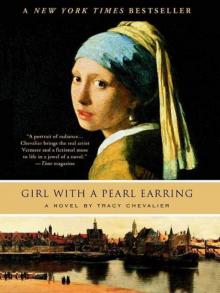 Girl With a Pearl Earring
Girl With a Pearl Earring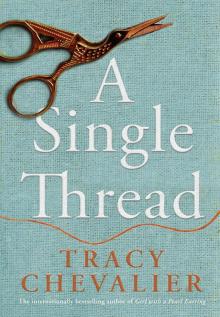 A Single Thread
A Single Thread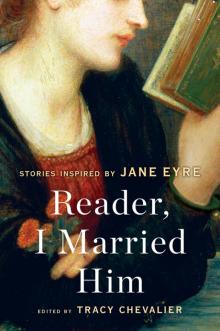 Reader, I Married Him: Stories Inspired by Jane Eyre
Reader, I Married Him: Stories Inspired by Jane Eyre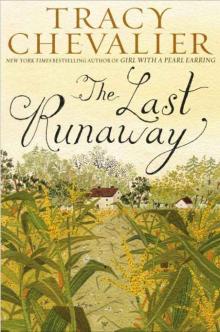 The Last Runaway
The Last Runaway Burning Bright
Burning Bright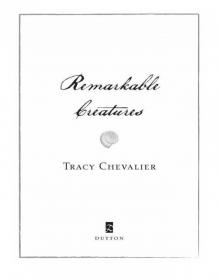 Remarkable Creatures
Remarkable Creatures At the Edge of the Orchard
At the Edge of the Orchard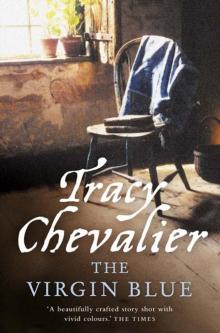 The Virgin Blue
The Virgin Blue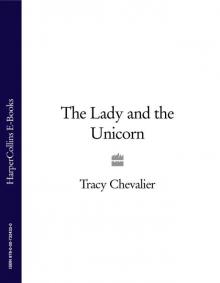 The Lady and the Unicorn
The Lady and the Unicorn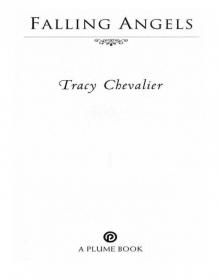 Falling Angels
Falling Angels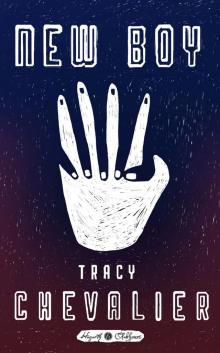 New Boy
New Boy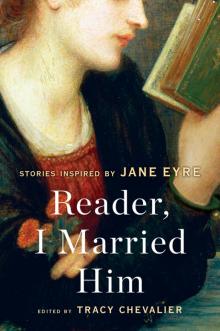 Reader, I Married Him
Reader, I Married Him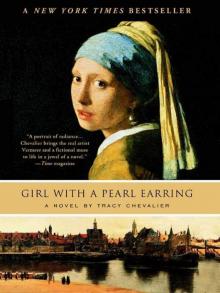 Girl with a Pearl Earring, The
Girl with a Pearl Earring, The